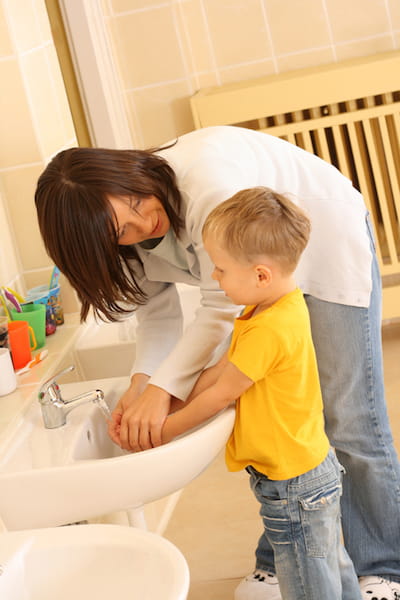Why you (and your kids) shouldn't use antibacterial soap anymore
No more antibacterial soap. Not at home. Not at school. Not at all for healthy people.
If that recommendation sent you reeling, you aren’t alone. Just about everything these days seems to claim some kind of antibacterial activity- soaps, cleansers, body washes, the list goes on and on. We thought that was a good thing, right? Don’t we parents purchase those antibacterial hand soaps and cleansers because we believe that it keeps our families healthier?
More antibacterials equals healthier people? Not so fast
It makes logical sense to assume that if bacteria can make you sick (and antibacterial drugs can heal and prevent bacterial infections) that more frequent use of antibacterial agents would keep you healthier. It would make sense, but it isn’t true.
In science and in medicine, we are forced to humbly accept that sometimes the natural world is more complex and more dynamic than our minds can fully comprehend. That’s why we do experiments and medical studies- to use all of the tools at our disposal to get as close to the truth as we can- to prove something instead of assume it. We test our beliefs and our feelings to determine whether they hold true in the real world.
And here’s what medical science has proven to us about antibacterial drugs- frequent use and overuse of them has contributed to the development of bacterial resistance, which is a serious public health concern for every single one of us.
What is antibiotic resistance?
If you’re not familiar with the term “antibiotic resistance” you can think of it this way: Imagine we are in the middle of a war, and we depend on our sophisticated weapons to protect us from the enemy. But what if we took all of our weapons over to the enemy’s side and just handed them over? They could take a look at what we had and steal the proprietary technology that gave us our edge over them. They would take the very defenses we created and use them against us, and suddenly our ability to defend ourselves is dramatically weakened.
Every time we use an antibiotic, we are giving harmful bacteria the information it needs to use our own weapons against us. Bacteria mutates easily and when bacteria is exposed to antibiotics, we are giving that bacteria the chance to select and multiply the mutations that we can’t protect against.
When we have a bacterial infection, we try to use the antibiotic that is most streamlined for the exact organism causing the infection in order to get us healthy while minimizing the risk of antibiotic resistance. However, the haphazard and routine use of antibacterials contributes to resistance, which means that more and more bacteria now do not respond to the antibacterial medications currently available. We know now there will be some who suffer from infections that we will not be able to heal. It means that our opponent has been given our playbook and knows every move we will make, and for some people this will make the difference between life and death.
Why is hand soap particularly concerning?
Antibacterial hand soap is an area of concern first because of its pervasiveness. These antibiotic agents are now on every sink in our homes and schools and offices, and the frequency of exposure to antibiotics is a problem as we try to prevent the development of resistance.
 The agents in antibacterial soaps are also under scrutiny because there has been no scientific evidence to show that antibacterial soap is more effective than regular soap and water or that they are safe for long-term use.
The agents in antibacterial soaps are also under scrutiny because there has been no scientific evidence to show that antibacterial soap is more effective than regular soap and water or that they are safe for long-term use.
The Food and Drug Administration (FDA) in 2013 asked manufacturers to submit data proving long-term safety and efficacy of these products, and failure to do so has prompted the FDA to restrict usage of several common antibacterial agents in soap. Manufacturers will be forced to change their formulations, but there are still some antibacterial agents that may be used in soaps. It’s likely that you’ll still see some formulation of antibacterial soap on shelves, even if their use is not recommended.
Antibacterial hand soaps pose a problem for another reason as well- they kill not only the potentially “bad” bacteria, but they also kill “good” bacteria which our bodies need to function properly. Our bodies depend heavily on the presence of “good” bacteria to fight illness and maintain health, and antibacterial soaps work against our bodies’ own natural defenses.
What we can do
It is imperative that we begin to use antibacterial agents more carefully, and while this often applies to the way your doctors and pharmacists treat illnesses within hospitals and doctor’s offices, it also affects some of the choices you make in your home.
Wash your hands frequently to prevent the spread of germs, and wash them with regular soap and water. It works, and it doesn’t pose long-term risks.
It’s also fine to continue using alcohol-based hand sanitizers- they aren’t a concern for creating resistance. But don’t spend your money on antibacterial soaps- the regular kind is just fine. In fact, it’s much better in the long run, for you and the world around you.







